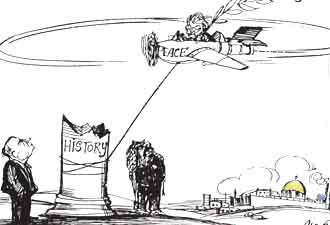
|

|
Jewish World Review / April 2, 1998 / 6 Nissan, 5758

A breakthrough in Lebanon?
By Richard Z. Chesnoff
ThE HEADLINES TELL us how badly negotiations between Israelis and
Palestinians are mired in mud. But while Israel
plays tough and the Palestinians threaten another intifada unless they
get their way, a quiet peace deal is shaping up behind the scenes
with another of Israel's Arab neighbors: Lebanon.
Recent secret talks in Paris -- and the interlocutor services of
both the United States and France - could bring about a badly
needed reign of peaceful co-existance along Israel's northern
border. That dream deal would include a withdrawal of Israeli
troops from the security zone they occupy in southern Lebanon in
exchange for a guarantee that Lebanese-based Hezbollah terrorists
would be put to heel. It's a state of peace that would be
welcomed by both the Christian and Muslim Arabs of southern
Lebnanon as well as the tens of thousands of Israelis who live in
Galilee towns and villages - all favorite targets for bombardment
by Islamic extremists .
The key to success: the ability of Lebanese forces to fill the
vacuum left by an Israeli withdrawal. It was Beirut government's
failure to secure its southern reaches from Palestinian and
Hezbollah guerillas that led Israel to move in to begin with.
Since 1982, Israeli troops have operated in a 9 mile deep sliver
of Lebanese land they call the "Lebanese security zone". The
object: to contain first the Palestine Liberation Army and now
Hezbollah -- the fanatics who also targets Americans and most
anyone from the West. The Israelis have been aided in this
difficult strategic task by a small Lebanese Christian militia
called the "Southern Lebanese Army".
It's been a costly job -- and hasn't always succeeded. Millions
in Israeli resources have been spent in Lebanon and most
expensive of all, operations there have cost more than 845 young
Israeli lives -- something that for small Israel is akin to the
US losing 34,000 men.
Sadly, the casualty figures keep rising. Many Israelis look upon
the Lebanon battle as their Vietnam - a war you cannot win. Some
even call for a unilateral withdrawal - arguing that even if the
Lebanese won't cooperate, Israel should just move out.
Israeli military leaders disagree. They contend that would just
be too dangerous. But they are pushing for a negotiated
withdrawal -- hence the recent secret talks with Lebanese
leaders.
Israel's Benjamin Netanyahu has let it be known that he favors
such a deal. Cynics claim he's bluffing, that he's merely using
the Lebanese card to draw attention away from Bill Clinton's
latest peace plan. Under that proposal, Israel would withdraw
from another 13 per cent of the West Bank and turn control over
to the Palestinians. In exchange, Yasser Arafat would crush
terrorists and undertake other security measures he's promised on
six previous occasions. Netanyahu at first said no, the plan was
unsafe. Now he's apparently proposing a withdrawl of about 10
per cent. Negotiations are underway. But the Israelis fear
Clinton will go public anyway to increase pressures on Jerusalem.
The White House would do better to put greater efforts into
a Lebanon deal. For that they need an additional dancing
partner: Syria and its dictator Hafez Assad, the
prime power brokers in Lebanon. If Assad wants to stop Hezbollah,
he will -- simply by cutting the flow of Iranian weapons they
receive each week. Then he'll give the nod to Lebanese troops.
Assad says he won't make any deals on Lebanon without a deal on
the Golan Heights - that frighteningly strategic mountain area
from which Syria bombarded Israel until Israeli forces captured
it in the 1967 Six Day War. But Lebanon is ultimately more
important to Assad than even the Golan. So there may be room for
a deal. If so, it might even inspire Netanyahu and Arafat to pull
themselves out of the
3/30/98: Full rights for all Israelis?
2/27/98: America's Schindler
1/30/98: A last chance for the Mideast?
1/11/98: The Moment for Restitution Has Arrived